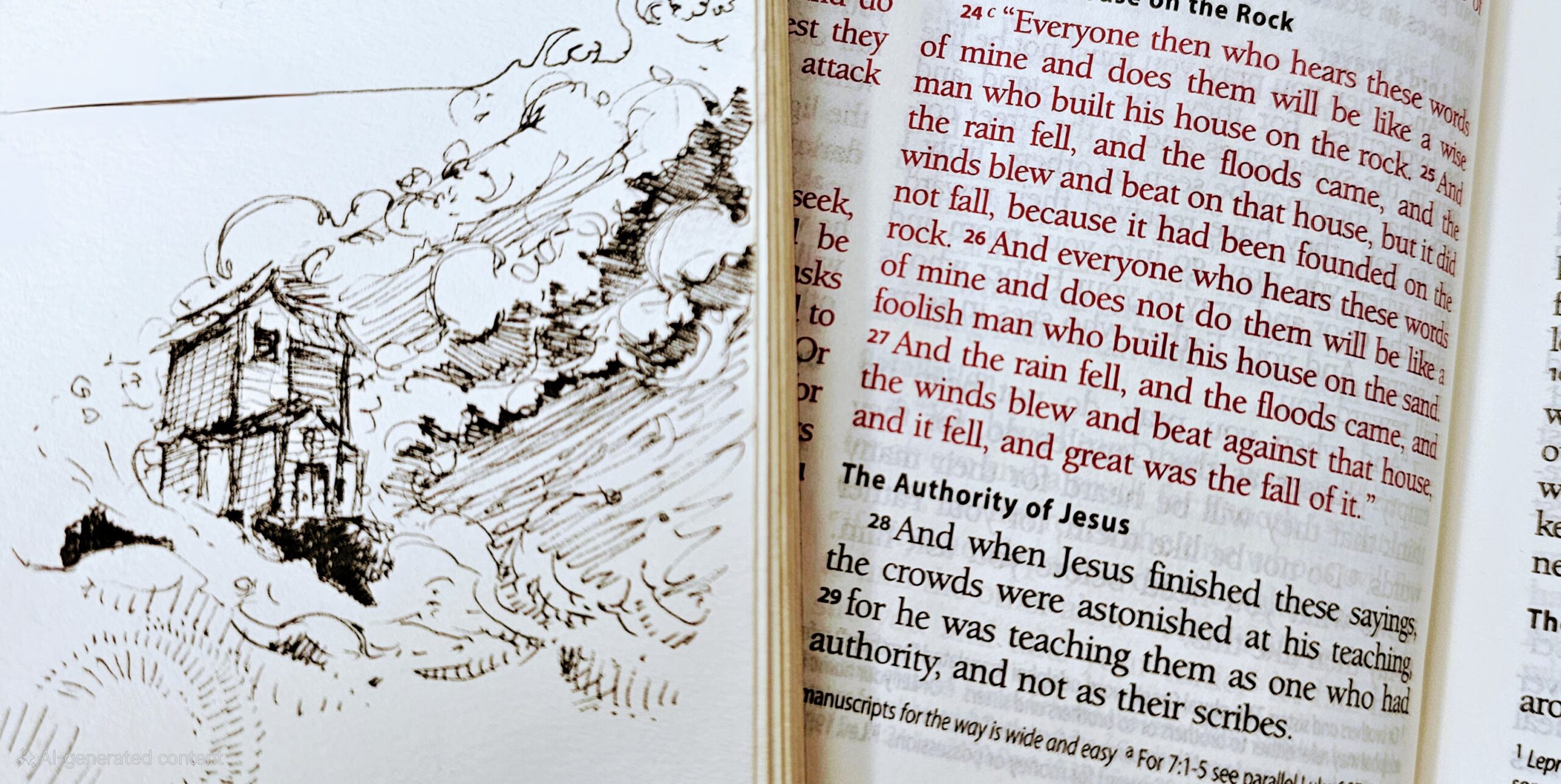Hearing and Doing: Building on the Rock
Based on a sermon preached at Osborne Village Church by Elder Timothy Reeve
In this final section of the Sermon on the Mount, Jesus closes His first address as King to His people with a powerful call to action. The sermon, delivered with unmatched authority, leaves the crowd amazed—not because He quoted other teachers, but because He spoke as the ultimate authority Himself (Matthew 7:28-29). Today, we’ll explore three metaphors Jesus uses to illustrate what it means to live in His kingdom: wolves in sheep’s clothing, good and bad trees, and houses built on rock or sand. These images, paired with the earlier metaphor of the narrow and broad roads, paint a vivid picture of the choice before us—life in the kingdom or destruction outside of it.
Jesus doesn’t mince words. There’s no middle ground, no pluralism, no “everyone gets to heaven.” You’re either on the narrow road or the broad one, following the true shepherd or deceived by wolves, bearing good fruit or bad, building on solid rock or sinking sand. Each metaphor reinforces the same truth: the kingdom demands a response, and the stakes are eternal. Let’s unpack these lessons and see how they shape our lives.
Beware of Wolves in Sheep’s Clothing
Jesus warns, “Beware of false prophets, who come to you in sheep’s clothing but inwardly are ravenous wolves” (Matthew 7:15). These aren’t cartoonish villains with obvious red flags. The Greek word pseudo-prophetone—false prophets—suggests they’re clever imitations, blending in with the flock. Their goal isn’t to join the sheep but to devour them, satisfying their own desires at the expense of the flock and the shepherd.
False teachers can be subtle. Some deny Christ outright, making them easy to spot. Others cloak their deception in Christian language, requiring discernment. Jesus doesn’t give a step-by-step guide for confronting them here—other scriptures address that (e.g., Galatians 2, 1 Timothy 5:22-25). His point is simpler: be aware. Wolves exist, and their presence threatens the flock. We must watch, not hunt, and approach suspicion with care—neither elevating nor condemning too quickly. Time and fruit will reveal the truth.
Good Trees Bear Good Fruit
Next, Jesus shifts to a botanical metaphor: “A good tree bears good fruit, but a bad tree bears bad fruit” (Matthew 7:17-18). False teachers aren’t just known by their words—Satan himself has better theology than us—but by their lives. Fruit takes time to grow, and it’s only up close that you can tell if it’s good or rotten. Like inspecting produce, we need to get near enough to see, smell, and taste the evidence.
How do we spot bad fruit? Jesus warns that some will cry, “Lord, Lord,” pointing to miracles and mighty works, yet He’ll say, “I never knew you” (Matthew 7:21-23). The issue isn’t their deeds but their hearts. They seek self-justification, not relationship. True fruit aligns with the Father’s will, flowing from intimacy with Him—“Our Father,” not just “Lord, Lord.” To discern this, we must immerse ourselves in God’s Word, growing so familiar with the real thing that imitations taste off, like cheap vanilla extract after tasting the real bean.
Build on the Rock, Not the Sand
Finally, Jesus paints a construction scene: two houses, one built on rock, the other on sand (Matthew 7:24-27). Both face the same storm—rain, floods, wind—but only one stands. The difference? The foundation. The rock is hearing and doing Jesus’ words; the sand is hearing without acting. Sand might seem strong—engineers know it can bear weight—but storms expose its weakness, washing it away.
Trials reveal what we’ve built on. False teachers thrive in calm weather, but storms unmask them. For us, too, difficulties test our foundation. When life hits hard, do we stand firm in Christ, or crumble in bitterness? Storms aren’t just threats—they’re opportunities to see where we’ve trusted Christ and where we haven’t. The good shepherd, gardener, and builder—Jesus Himself—saves us from wolves, prunes bad branches, and anchors us on the rock when we can’t save ourselves.
Living This Out
Head:
We must recognize that Jesus’ kingdom is exclusive—there’s no neutral ground. False teachers exist, their fruit betrays them, and our response to Christ’s words determines our foundation. This isn’t about intellectual assent alone; it’s about aligning our minds with the reality of His authority. We learn to be watchful, discerning, and rooted in Scripture, knowing that only Christ, the tested and victorious shepherd, can deliver us.
Heart:
This truth should stir humility and dependence. The wolves, bad trees, and crumbling houses remind us of our vulnerability—we can’t outsmart evil or withstand storms alone. Yet, Christ’s triumph over death and His intimate “I know you” to His sheep awaken awe and gratitude. We should feel desperate for His rescue, not our own efforts, and comforted that He’s already borne the ultimate trial for us.
Hands:
- Stay vigilant, not paranoid: Regularly feed on God’s Word to sharpen discernment, checking teachers (and ourselves) against it, not just charisma or results.
- Pursue relationship, not performance: In trials, resist self-justification (“Look what I’ve done!”) or legalism (“I’ll do more!”). Instead, cry out to the Father in trust, seeking intimacy over checklists.
- Build on Christ daily: Act on what you hear—obey Jesus’ words in small, practical ways. When storms hit, reflect: Is my frustration revealing sand? Repent, lean on Christ the solid rock, and let Him reshape your foundation.

